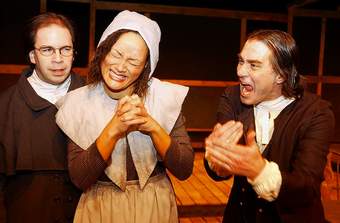CLICK HERE FOR The Statesman's REVIEW
March 14, 2005
(below is the paper's preview article)
The play about the Salem witch trials has a universal tone

ANDREA J. WRIGHT--STATESMAN JOURNAL
Jeff Brownson (right) yells at Chasity Malatesta (center) as Jeff Baer listens in Pentacle Theatre's performance of "The Crucible."
|
'The Crucible'
When: Opens Friday; performances at 8:15 p.m. Friday and Saturday, March 18-19 and 25-26 and April 1-2; 7:15 p.m. March 17, 23-24, 27 and 30-31; and 2 p.m. this Sunday and March 20 Where: Pentacle Theatre, 324 52nd Ave. NW, Salem Cost: $20 Friday and Saturday nights and Sunday matinees, $19 other shows; opening night and the matinees are sold out Call: (503) 485-4300
THE
CRUCIBLE
|
RON COWAN
Statesman Journal
March 10, 2005 -
Arthur Miller's "The Crucible," which opens Friday at Pentacle Theatre, may have been written with Cold War paranoia in mind, but it works in any era.
Miller, best known for "Death of a Salesman," was reflecting his own persecution before the House Un-American Activities Committee in this allegory about the Salem, Mass., witch trials, but he made the play universal in tone, director Pamela Abernethy said.
"He made the play about large and fundamental issues," she said. "He made the play about a yearning for what is right."
The 1953 work, which won the Tony Award for best play, uses actual events to criticize moments in history when man's reason becomes clouded with irrational fears and the result is a desire to place blame for society's problems on others.
The tale of fanaticism and justice miscarried starts when a few young girls, fettered by a rigid Puritan moral code, indulge in secret dances in the woods.
When one of them, Betty Parris (Desi Friesen), falls into a coma, she and the other girls say they are victims of the devil, blaming several innocent women they call witches.
The central plot concerns farmer John Proctor (Don Williamson), who had been seduced by young Abigail Williams (Molly McHugh); she now seeks revenge by implicating Proctor's wife, Elizabeth (Patricia Ullman), as a witch.
Proctor attempts to save his wife by implicating himself, a mistake in a climate of envy, greed and superstition.
McHugh, who played the same character in a high school production, described herself as the main agent of mischief.
“I’m pretty much the evil one,” she said. “I’m sleeping with John Proctor.
“It’s just blindly sticking with wanting to protect your own pride.
“The other thing is the girls have never gotten respect in their entire lives, and now the judges want to have dinner with them.”
Williamson described his character as remorseful; he wants to move on with his life.
Ullman describes Elizabeth as much more than an angry wife; she sees beyond her own situation.
“I kind of sympathize with Abby,” she said. “She got a broken heart, and that’s heavy.
“Women are still pretty much property at this point.”
Among Miller’s interesting female characters is the slave Tituba, who is the scapegoat at first but is wily enough to realize that she can survive by playing along.
“She’s a strong woman,” Chasity Malatesta said. “Whatever you want me to see, I’ll see; she survives.”
“We can look at the headlines today and see a reflection of the play’s truths,” she said.
“You are either for this court or against it,” Ullman said, which she sees as a reflection of current political attitudes in Washington, D.C.
“We try to be true to (Miller’s) historic context,” Abernethy said. “We’re not trying to make a moral statement in the play, draw the direction or make a didactic statement.
“It’s about what a community does when it’s in the throes of passion. There is, in the play, a breakdown of the social order in the community.”
Miller’s play turns on the immediacy of the devil in such a fundamentalist community, but he also looks at a community that’s already fractious before the girls start their accusations, a community already affected by social unrest.
Malatesta, a teacher who is appearing in her first Pentacle play, said she found it intimidating to be in this cast of 20, many of them experienced actors, with a few new to Pentacle.
“I’m really blessed in this play,” she said.
“I’d forgotten how physically exhausting drama can be,” Williamson said of his role. “It’s heavy; there’s not much in light moments.”
McHugh, for one, is enjoying the dramatics.
“It’s fun to be able to yell and scream on stage,” she said. “It’s hard to be serious all the time.”
Amid the conniving, yelling and unrest, “The Crucible” remains a play with an indelible social message.
Abernethy said a fascinating element of the ongoing drama is Deputy Gov. Danforth (Randy Bowser), who cares more about preserving the authority of his court than about justice.
Only John Proctor sounds the right moral tone, choosing morality over survival.
“I think there’s an uplifting aspect of the play,” Abernethy said. “Bottom line, it’s about integrity.”
Also in the cast are Jeff Baer as Rev. John Hale, Benny Bower as Francis Nurse, Jeff Brownson as Rev. Samuel Parris, Stephanie Falk as Susanna Wallcott, Kim Fanshier as Mary Warren, Robert Herzog as Giles Corey, Paul Hines as Ezekiel Cheever, Meygan Newsom as Mercy Lewis, Ray Phipps as Judge Hathorne, Kathy Straton as Rebecca Nurse, Danyelle Tinker as Mrs. Ann Putnam, Ruby Sue Whittley as Sarah Goode, Jim Wilson as John Willard and Tom Wrosch as Thomas Putnam.
Tony Zandol is in charge of set design and construction, and Julie Klingman is assistant director.
Ron Cowan
Copyright 2005 Statesman Journal, Salem, Oregon
